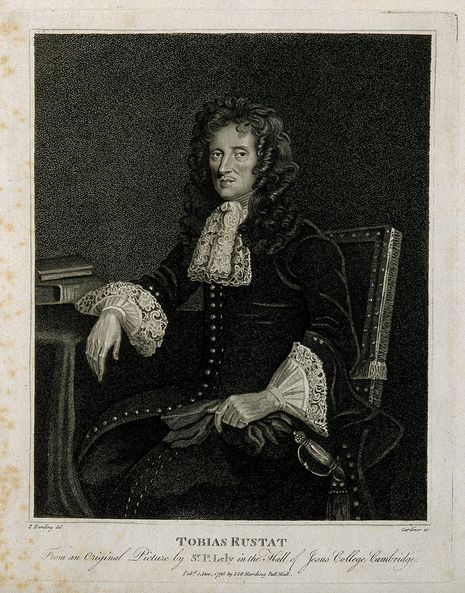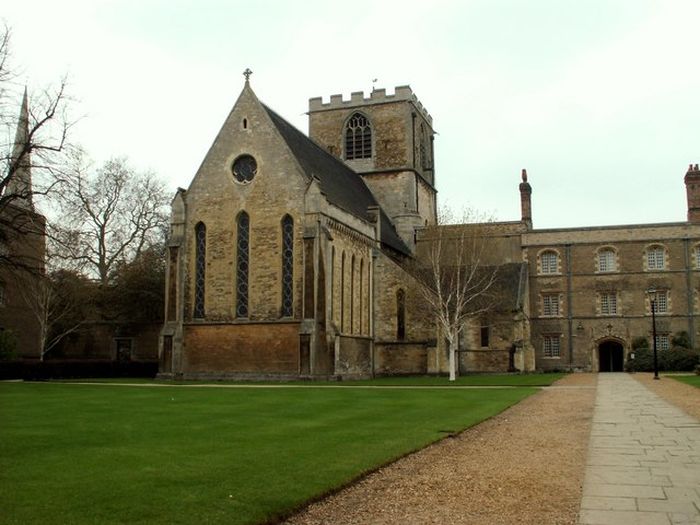Statue of slave trade investor may be moved from Old Schools site
Tobias Rustat, who gave the first endowment to the University Library, is celebrated in a small 19th Century statue

The University is considering removing a small statue of Tobias Rustat after the Legacies of Enslavement enquiry found links between him and the slave trade.
Rustat was a 17th Century courtier with investments in the Royal Africa Company, the company responsible for shipping more slaves from Africa to America during the period of the slave trade than any other institution.
Although Rustat was already very wealthy from his career in the court, his wealth increased further through his engagement with the Royal African Company. The donations he gave to the University, and other institutions around the county, came while he was receiving dividends from the Royal Africa Company.
Rustat gave the University Library its first endowment of £1000 in 1667 to buy “the choicest and most useful” books. Many of the books bought with his benefaction are emblazoned with his coat of arms.
Vice-Chancellor Stephen Toope asked the Legacies of Enslavement enquiry for recommendations on the future of the statue as part of the University’s wider attempt to learn about the University’s complicity, both financial and intellectual, in the transatlantic slave trade.
The statue, put up in the 19th Century, overlooks West Court at the Old Schools, which was the original site of the Library.
Although no decision has been made, the University states that “preliminary enquiries are being made about the process for removing the statue from the exterior of a Grade 1 listed building.”
Alongside the Legacies of Enslavement enquiry’s considerations into the statue, the University Library is also critically engaging with the Rustat Fund, which generates about £5000 a year.
A University statement details that: “The Library is currently determining how income from this Rustat Fund might be remodelled (and renamed) in order to support active research into the slave trade and its legacies.”
“For the 2020-21 financial year, income from the Fund will be spent on resources about the transatlantic slave trade and about the Black diaspora. Possible purchases will be identified collaboratively by library staff and researchers and final decisions will be taken by the Library’s Decolonisation Working Group.”
Dr Jessica Gardner, Cambridge University Librarian, said: “The devastation caused by the Atlantic slave trade continues to affect millions of people globally to this day. We cannot effectively demonstrate solidarity with our black colleagues and students at Cambridge – and with others around the world – without first examining and understanding how we as an institution have benefitted from the proceeds of slavery.
“As well as asking the Inquiry to look into the Rustat benefaction, we also want to determine, with the critical help of our colleagues from the BAME community at Cambridge, how the income generated by this historic donation is best dispersed going forward.”
The University’s announcement of its investigations into Rustat’s legacy comes shortly after Jesus announced that it would seek to move Rustat’s memorial from the College chapel.

Jesus propose relocation of Rustat memorial following recommendations of legacies of slavery enquiry
More broadly Jesus will remove any memorial to Rustat where he is explicitly celebrated rather than simply commemorated.
Rustat was a benefactor to many Oxbridge colleges, including both St John’s Oxford and St John’s Cambridge, as part of his wider aim of supporting Royalism and the Church of England after the Restoration.
Being “unmarried, with few household responsibilities” he was able to donate extensively to St Paul’s Cathedral, Chelsea Hospital and St John’s Hospital.
 News / Pembroke to convert listed office building into accom9 December 2025
News / Pembroke to convert listed office building into accom9 December 2025 News / Gov declares £31m bus investment for Cambridge8 December 2025
News / Gov declares £31m bus investment for Cambridge8 December 2025 Features / Searching for community in queer Cambridge10 December 2025
Features / Searching for community in queer Cambridge10 December 2025 News / Uni redundancy consultation ‘falls short of legal duties’, unions say6 December 2025
News / Uni redundancy consultation ‘falls short of legal duties’, unions say6 December 2025 Lifestyle / Into the groove, out of the club9 December 2025
Lifestyle / Into the groove, out of the club9 December 2025









